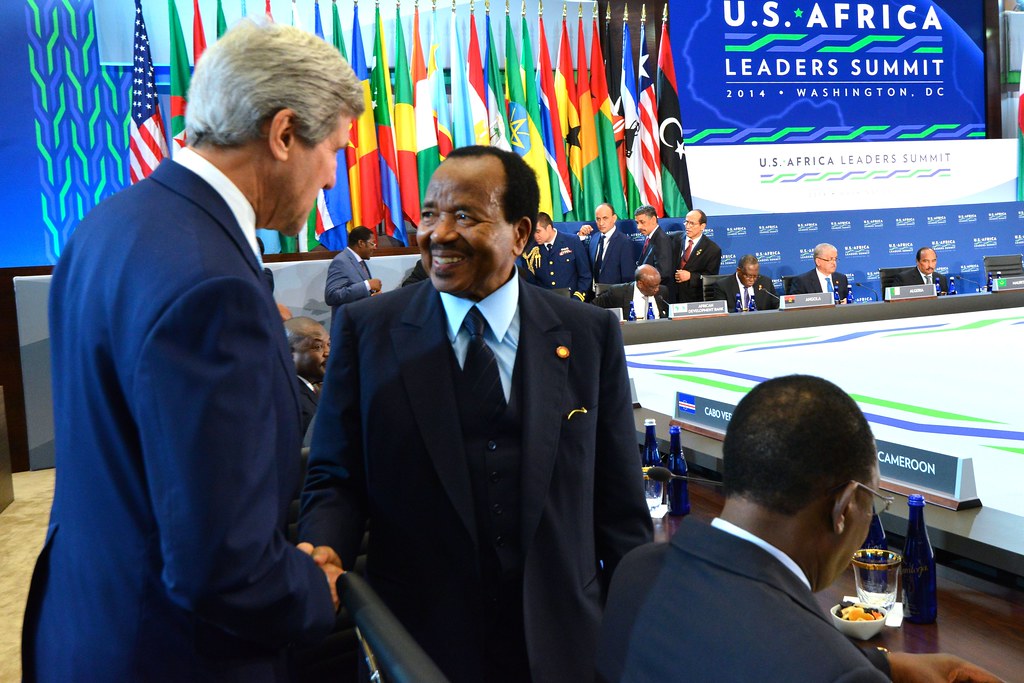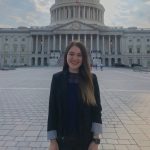The Republic of Cameroon, originally named Kamerun, is located in West Africa. The current President is Paul Biya, who is also one of only two presidents that Cameroon has had and the longest-serving leader in Africa, for over thirty years. Biya started his political career at the age of 43, as Cameroon’s Prime Minister under Ahmadou Ahidjo in 1975, becoming his successor in 1982. Because of his presidential ability, Biya modified the Cameroonian Constitution to allow presidents to serve for more than two terms and to be eligible for re-election every seven years.1 Even though Biya’s previous presidential elections ran smoothly, as 2016 arrived, Biya knew he would be faced with a formidable opponent, the Southern Cameroons National Council (SCNC).
In 1955, Kamerun gained independence from France and Great Britain. Then, in 1961, Ahmadou Ahidjo was elected President and renamed the country to the Federal Republic of Cameroon. Five years later, Ahidjo banned all political parties to avoid the lobbying of ethnic groups that were seen as a threat to national unity, including English-speaking communities.2 Nonetheless, in 1972, Cameroon created a new constitution that declared French as the language of the Eastern state and English as the language of the Western state, although English actually dominated Cameroonian commerce, technology, education, and politics.3 Yet, French officials saw this constitutional provision as a threat, and used French as the administration’s language of preference.4
After twenty-two years of ruling Cameroon, Ahidjo was pressured to resign by the French socialist government.5 His successor was his former prime minister, Paul Biya.6 Biya continued under Ahidjo’s party, Cameroonian National Union (CNU). Shortly after, former president Ahidjo regretted his decision in assigning Biya as his successor and attempted to overthrow him through a coup.7 For this reason, Ahidjo fled into exile in 1983 for attempting to conspire against the government. Absent from his trial, he was found guilty and sentenced to death.8 Biya then renamed Cameroon to the Republic of Cameroon and created the Cameroonians People’s Democratic Movement (CPDM) party, which later won the majority of the seats in parliament, thereby turning Cameroon into the most corrupt country in the world, according to Transparency International.
In December 1990, President Biya legalized the creation of a multiparty system to prove his party’s legitimacy. This introduced the union of parties with a connection to specific ethnic groups or provinces.9 When the first elections were held, Biya’s party won less than fifty percent of the seats, whereas the new parties won over sixty-eight percent of the seats. Biya knew he would have a problem if he did not join forces with the newly elected ruling party, so he did.10
With the establishment of a multiparty system, the anglophone regions organized a meeting in 1993 to promote a return to federalism, known as the All Anglophone Conference (AAC). However, the proposal was rejected twice by the Consultative Committee for Review of the Constitution. This did not stop the anglophone community as they created a council to encourage the two-state federation known as the Southern Cameroons National Council (SCNC). The SNCS members continued to hold protests in the anglophone provinces every October 1, advocating for their independence, calling it the Republic of Ambazonia.11

As an attempt to fix this problem, Biya modified the constitution in 2008, in agreement to establish English and French as the official languages, so they could both share equal status.12 However, in 2016 the French-speaking government imposed the use of French language in schools and courts in anglophone parts of Cameroon.13 In opposition to this, English-speaking teachers and lawyers protested against the employment of French-speaking educators and officials, who did not speak English and had no prior knowledge over the judicial courts. This alteration became known as the “anglophone crisis.”14 Anglophones argued that their minority rights were being violated and felt their judicial, educational, and local government systems should be protected. Both, anglophone lawyers and teachers formed the Cameroon Anglophone Civil Society Consortium (CASCSC). Meanwhile, Biya and his French-administered government were calling the anglophone activists “separatists.”15

In October 2017, the anglophone separatist leader, Julius Tabe, declared the independence of the Republic of Ambazonia. With elections less than a year away, Biya knew he had to do something about this. He was not going to let any “separatist” seize the country he has been leading for thirty-five years. Biya responded to this act by shutting down the internet for three months, banning the CACSC and SCNC, and incarcerating several leaders of these movements.16 This instigated violent protests in major cities in Northwest and Southwest Cameroon, leaving many dead and injured.17 The violence caused over 30,000 Cameroonians to flee their homes into the neighboring country, Nigeria.18 During 2017, several businesses, government buildings, automobiles, and schools had been set on fire in the anglophone regions by, both, the anglophones and francophones. As a result, schools were shut down for over a year, leaving hundreds of children without an education. Additionally, because of the protests by the anglophone community, Biya made several policies, such as the banning of any crowds with more than four people, imposing curfews, and deploying military forces into anglophone regions of Cameroon seeking to kill any “separatists” that may be a threat to the country.19

Biya was not going to let an opposing party diminish his chances of reelection, much less would he let them destroy the country he had built for over thirty years. According to an International Crisis Group, one of Cameroon’s Supreme Court justices was arrested for funding an anglophone campaign in 2017, and since then has been imprisoned. Because of these occurrences and the violence between both groups, anglophone communities were left in fear and without shelter, food, water, or healthcare. Throughout this time, Biya denied the existence of an “anglophone crisis.” Instead, the ruling party, Cameroon People’s Democratic Movement (CPDM), organized the first celebration of Cameroon’s reunification in support of the Republic of Cameroon and President Biya.20
Biya frightened thousands of individuals that only half of the country’s eligible voters partook in the presidential election and in October 2018, Paul Biya won his seventh presidential term. The opposition party called for a re-run of the presidential election in 2018 but was denied by the Constitutional Council, leaving the inhabitants of Cameroon in desperation for reform and an end to the language division. Today, President Biya has shown no signs of a compromise; instead, he continues to send military troops to kill or arrest those who appear a threat to the Republic of Cameroon.
International organizations, including the United Nations, European Union, and African Union have urged the anglophone and francophone parties to abstain from violence. and to preferably engage in a dialogue to reach an agreement that compliments both parties. However, Biya claims it has attempted numerous methods to deal with the anglophone community.21 Up to the present moment, Biya does not have a successor to follow his presidency, leaving critics to believe that the only way for Cameroon to prosper is to have a change of president. For now, Biya does not plan on letting anyone get in his way.
- Constitute, “Cameroon’s Constitution of 1972 with Amendments through 2008 PDF file,” Constitute Project, August 12, 2019, https://www.constituteproject.org/constitution/Cameroon_2008.pdf?lang=en. ↵
- “Cameroon’s Worsening Anglophone Crisis Calls for Strong Measures,” International Crisis Group, July 12, 2018, https://www.crisisgroup.org/africa/central-africa/cameroon/130-cameroon-worsening-anglophone-crisis-calls-strong-measures. ↵
- Carlous Muluh Nkwetisama, “Rethinking and reconfiguring English language education: Averting linguistic genocide in Cameroon,” International Journal of Applied Linguistics and English Literature 6, no. 6 (2017): 106. ↵
- Bernard Fonlon, “The language problem in Cameroon. (An historical perspective),” Comparative Education 5, no. 1 (1969): 38. ↵
- Tangie Nsoh Fonchingong, “Multipartyism and democratization in Cameroon,” Journal of Third World Studies 15, no. 2 (1998): 122. ↵
- BBC, “Cameroon profile – Timeline,” BBC News, October 22, 2018, https://www.bbc.com/news/world-africa-13148483. ↵
- Paul Lewis, “Cameroon Radio Says An Attempted Coup Has Failed,” The New York Times, April 7, 1984, https://www.nytimes.com/1984/04/07/world/cameroon-radio-says-an-attempted-coup-has-failed.html. ↵
- Glenn Fowler, “Ahmadou Ahidjo of Cameroon Dies; Ex-Leader was 65,” The New York Times, December 2, 1989, https://www.nytimes.com/1989/12/02/obituaries/ahmadou-ahidjo-of-cameroon-dies-ex-leader-was-65.html. ↵
- Tangie Nsoh Fonchingong, “Multipartyism and democratization in Cameroon,” Journal of Third World Studies 15, no. 2 (1998): 120. ↵
- The Commonwealth, “Cameroon: Constitution and politics,” Accessed 2020, https://thecommonwealth.org/our-member-countries/cameroon/constitution-politics. ↵
- “Cameroon’s Worsening Anglophone Crisis Calls for Strong Measures,” International Crisis Group, July 12, 2018, https://www.crisisgroup.org/africa/central-africa/cameroon/130-cameroon-worsening-anglophone-crisis-calls-strong-measures. ↵
- The Commonwealth, “Cameroon: Constitution and politics,” Accessed 2020, https://thecommonwealth.org/our-member-countries/cameroon/constitution-politics. ↵
- Siobhan O’Grady, “Divided by Language,” The Washington Post, February 5, 2019, https://www.washingtonpost.com/graphics/2019/world/cameroon-anglophone-crisis/. ↵
- BBC, “Cameroon profile – Timeline,” BBC News, October 22, 2018, https://www.bbc.com/news/world-africa-13148483. ↵
- Siobhan O’Grady, “Divided by Language,” The Washington Post, February 5, 2019, https://www.washingtonpost.com/graphics/2019/world/cameroon-anglophone-crisis/. ↵
- Nna-Emerka Okereke, “Analysing Cameroon’s Anglophone Crisis,” Counter Terrorist Trends and Analyses 10, no. 3 (2018): 9. ↵
- “Cameroon’s Worsening Anglophone Crisis Calls for Strong Measures,” International Crisis Group, July 12, 2018, https://www.crisisgroup.org/africa/central-africa/cameroon/130-cameroon-worsening-anglophone-crisis-calls-strong-measures. ↵
- Siobhan O’Grady, “Divided by Language,” The Washington Post, February 5, 2019, https://www.washingtonpost.com/graphics/2019/world/cameroon-anglophone-crisis/. ↵
- “Cameroon’s Worsening Anglophone Crisis Calls for Strong Measures,” International Crisis Group, July 12, 2018, https://www.crisisgroup.org/africa/central-africa/cameroon/130-cameroon-worsening-anglophone-crisis-calls-strong-measures. ↵
- “Cameroon’s Worsening Anglophone Crisis Calls for Strong Measures,” International Crisis Group, July 12, 2018, https://www.crisisgroup.org/africa/central-africa/cameroon/130-cameroon-worsening-anglophone-crisis-calls-strong-measures. ↵
- “Cameroon’s Worsening Anglophone Crisis Calls for Strong Measures,” International Crisis Group, July 12, 2018, https://www.crisisgroup.org/africa/central-africa/cameroon/130-cameroon-worsening-anglophone-crisis-calls-strong-measures. ↵




52 comments
Haley Ticas
It is very crazy and interesting how Biya went for power but then chose to ban the internet from the country. The leader would prefer to send forces out to stop his own people rather than listen to them and what they have to say, just to save his name and his Republic order. This article t is well written, and truly an interesting read as I had no prior knowledge of the topic.
Edward Cerna
This was a super fascinating read as it is super interesting because I am so used to only being aware of American politics and not other countries. This article taught me a great deal about another nations politics. It showed me just how cruel their president is and I am surprised that this is not covered more in western news. I found it surprising just how big a factor the language differences are and the effect that had.
Victor Rodriguez
I am terrified to look at stories that emphasize bad leadership and extremely poor administration to bring a whole nation to disaster. Many African nations have their people suffering on many levels. This story just shows how a bad leader like President Biya creates many uncertain times and fear in the country. A leader with power should utilize that authority for good rather to to harm others because that just leads a developing country into chaos.
Camila Garcia
The article is very interesting and really captured my attention. I do not know much about Paul Biya’s presidency, but this article informed of how cruel he is. The context provided at the beginning of the article helped the article run more smoothly. I find it interesting how Biya punishes those who speak another language. I feel as if the UN should get heavily involved.
Aaron Peters
I had no idea about what was happening in Cameroon. The brutal measures employed by President Biya are hardly talked about in American Media, and it appears the UN and other international agencies are left with little power to prevent further carnage. I found the clash formed from the lingistic differences to be a surprising part of the story as well, with President Biya’s French speaking government opposing the English Speaking populations having further strained relations to the brink of war between the communities.
Raul Colunga
This is one of many similar stories from heads of countries in Africa that do whatever they deem necessary to keep hold to power. In this case, Biya was given the position instead of acquiring to seat through force. Division of the population by language also throws a wrench into the difficulty Cameroon has faced. It makes me wonder if the institutions in Cameroon like education are taught in either French or English prevent certain children from attending school due to language barriers.
Andrea Laguna
Quite an impressive article! The title really caught my attention! I have always thought that the countries that are bilingual have an advantage, but in this case, having two different languages caused death and violence. I was not conscious about the situation in the Republic of Cameroon. I believe, that as the current president, Paul Biya should be looking for a way to stop war between the Anglophone and the Francophone parties, not being part of them.
Allison Grijalva
Hi Lesly! Thank you for taking the time to write this article. As someone who has never lived anywhere outside of the United States, it is very easy to become consumed with Westernized news and information that things like this are often overlooked. This political transition, and battle, over language is a prime example of how cultural and political transition of a nation can go hand in hand. The consequences of those in power that trickles down to the innocent people and children is very hard. In all transitions that occur in life and in a nation it seems that this friction and violence is unfortunately inevitable. Thank you for shedding some light on this important topic!
Grace Frey
It is interesting how President Biya decided to make seemingly huge sacrifices, like the combination of political parties, to maintain his hold on his power. His actions now, however, primarily the killing of anyone that he perceives to be a threat to the Republic of Cameroon seems like acts of desperation. It is frustrating that the UN and other IGO’s are left powerless to do anything without the allowance of Biya, which at this point is a zero percent chance. I am also frustrated that as an International and Global studies AND Political Science major that this is the first I am hearing of the conflict in Cameroon. Thank you for informing me of an issue that I was previously unaware of.
Karla Cardenas
The article was really thought-provoking. I wasn’t aware that language barriers can be taken so far due to having any conflict over a language, but I can understand how it can get to that point, it’s just unfortunate. It’s so upsetting knowing that it was taken so far in terms of being violent. The title was a clever way to express what President Biya did, but so upsetting to know what he did.